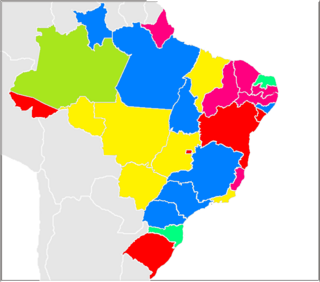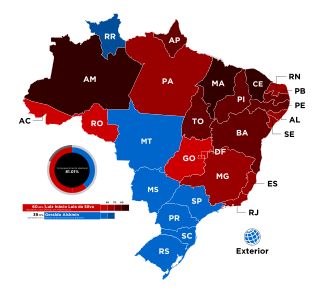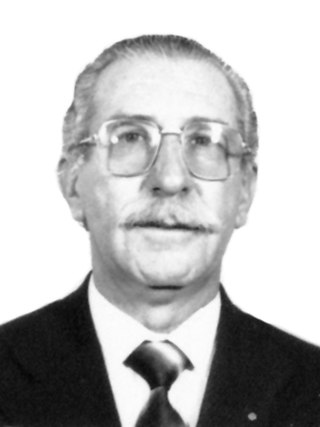Related Research Articles

The Workers' Party is a centre-left to left-wing political party in Brazil that is currently the country's ruling party. Some scholars classify its ideology in the 21st century as social democracy, with the party shifting from a broadly socialist ideology in the 1990s. Founded in 1980, PT governed at the federal level in a coalition government with several other parties from 1 January 2003 to 31 August 2016. After the 2002 parliamentary election, PT became the largest party in the Chamber of Deputies and the largest in the Federal Senate for the first time. With the highest approval rating in the history of the country, President Luiz Inácio Lula da Silva is PT's most prominent member. Dilma Rousseff, also a member of PT, was elected twice but did not finish her second term due to her impeachment in 2016. The party came back to power with Lula's victory in the 2022 presidential election.

The Brazilian Social Democracy Party, also known as the Brazilian Social Democratic Party or the Party of Brazilian Social Democracy, is a political party in Brazil. As the third largest party in the National Congress, the PSDB was the main opposition party against the Workers' Party (PT) administrations of Luiz Inácio Lula da Silva and Dilma Rousseff from 2003 to 2016.

Progressistas is a centre-right to right-wing political party in Brazil. Founded in 1995 as the Brazilian Progressive Party, it emerged from parties that were successors to ARENA, the ruling party of the Brazilian military dictatorship. A pragmatist party, it supported the governments of presidents Fernando Henrique Cardoso, Luiz Inácio Lula da Silva, Dilma Rousseff, Michel Temer and Jair Bolsonaro. Largely it was the party of the politics of Paulo Maluf, a former governor and mayor of São Paulo. Of all political parties, in corruption investigation Operation Car Wash, the Progressistas had the most convictions.
Cidadania is a Brazilian political party. It was originally founded as the Popular Socialist Party by members of the former Brazilian Communist Party (PCB), as a centre-left social democratic and democratic socialist party. Despite its left-wing alignment, PPS moved to be opposition against the Workers' Party since 2004, forming alliances with centre-right parties, in particular the Brazilian Social Democracy Party (PSDB), and supporting the Impeachment of Dilma Rousseff. Later the party's National Convention adopted the new naming in March 2019, and it was later approved by the Superior Electoral Court that September. The party then began moving towards a more social liberal position akin to the third way.

The Brazilian Socialist Party is a political party in Brazil. It was founded in 1947, before being abolished by the military regime in 1965 and re-organised in 1989 after the re-democratisation of Brazil. It elected six Governors in 2010, becoming the second largest party in number of state governments, behind only PSDB. In addition to that, it won 34 seats in the Chamber of Deputies and three seats in the Senate, besides having been a member of the For Brazil to Keep on Changing coalition, which elected Dilma Rousseff as President of Brazil.

Presidential elections were held in Brazil in 1989, with the first round on November 15 and a second round on December 17. They were the first direct presidential elections since 1960, the first to be held using a two-round system and the first to take place under the 1988 constitution, which followed two decades of authoritarian rule after the 1964 Brazilian coup d'état.

The 2010 Brazilian gubernatorial elections were held on Sunday, October 3, as part of the country's general election. In these elections, all 26 Brazilian states and the Federal District governorships were up for election. When none of the candidates received more than a half of the valid votes in a given state, a run-off was held on October 24, 2010 between the two candidates with the most votes. According to the Federal Constitution, Governors are elected directly to a four-year term, with a limit of two terms. Eleven governors were prohibited from seeking re-election.

General elections were held in Brazil on 1 October 2006 to elect the president, National Congress and state governors, with a second round of the presidential election on 29 October as no candidate received more than 50% of the vote in the first round.

Events in the year 1929 in Brazil.

The 55th Legislature of the National Congress was a meeting of the legislative branch of the Brazilian federal government, consisting of the Chamber of Deputies and the Federal Senate. It met in Brasília from February, 1 2015 to January, 31 2019. All members of the Chamber of Deputies and one-third of the Senate were elected in the elections of 5 October 2014.

Events in the year 1998 in Brazil.

The following lists events that happened in the year 1989 in Brazil.

Events in the year 1988 in Brazil.
The 2021 President of the Federal Senate of Brazil election took place on 1 February 2021, during the opening day of the 3rd Session of the 56th Legislature of the National Congress.

The 2022 Mato Grosso do Sul state election took place in the state of Mato Grosso do Sul, Brazil between 2 October 2022 and 30 October 2022. Voters elected a governor, vice governor, a senator, 8 representatives for the Chamber of Deputies of Brazil and 24 Legislative Assembly members. The incumbent governor at the time, Reinaldo Azambuja, wasn't allowed to run for reelection for a third consecutive time due to term limits established by the Federal Constitution of Brazil.

Harry Amorim Costa was a Brazilian engineer and politician, the first governor of Mato Grosso do Sul when he was a civil servant of the National Department of Works Saneamento, a federal autarchy created by Ernesto Geisel.

Wilson Barbosa Martins was a Brazilian centenarian, lawyer and politician affiliated with the Brazilian Democratic Movement (MDB). For Mato Grosso do Sul, he was governor of Mato Grosso do Sul for two terms, senator and federal deputy for two terms, as well as mayor of the future capital Campo Grande.

Nelson Trad Filho, better known as Nelsinho Trad, is a Brazilian physician and politician, affiliated with the Social Democratic Party (PSD), is currently a senator for Mato Grosso do Sul. Son of the politician Nelson Trad Sr., he graduated in Medicine from Universidade Gama Filho in Rio de Janeiro, Brazil. Physician specializing in General Surgery, Urology, Occupational Medicine and Public Health.
General elections will be held in Brazil on 4 October 2026 to elect the president, vice president, members of the National Congress, the governors, vice governors, and legislative assemblies of all federative units, and the district council of Fernando de Noronha. If no candidate for president—or for governor in some states—received more than half of the valid votes in the first round, a runoff election for these offices will be held on 31 October.

Paulo José Araújo Corrêa is a Brazilian politician, affiliated with the Brazilian Social Democratic Party, president of the Legislative Assembly of Mato Grosso do Sul since February 2019, serving his sixth term as State Deputy for the state.
References
- ↑ "Disclosure System of Election Results" (in Portuguese). Superior Electoral Court (Brazil). Retrieved 28 October 2014.